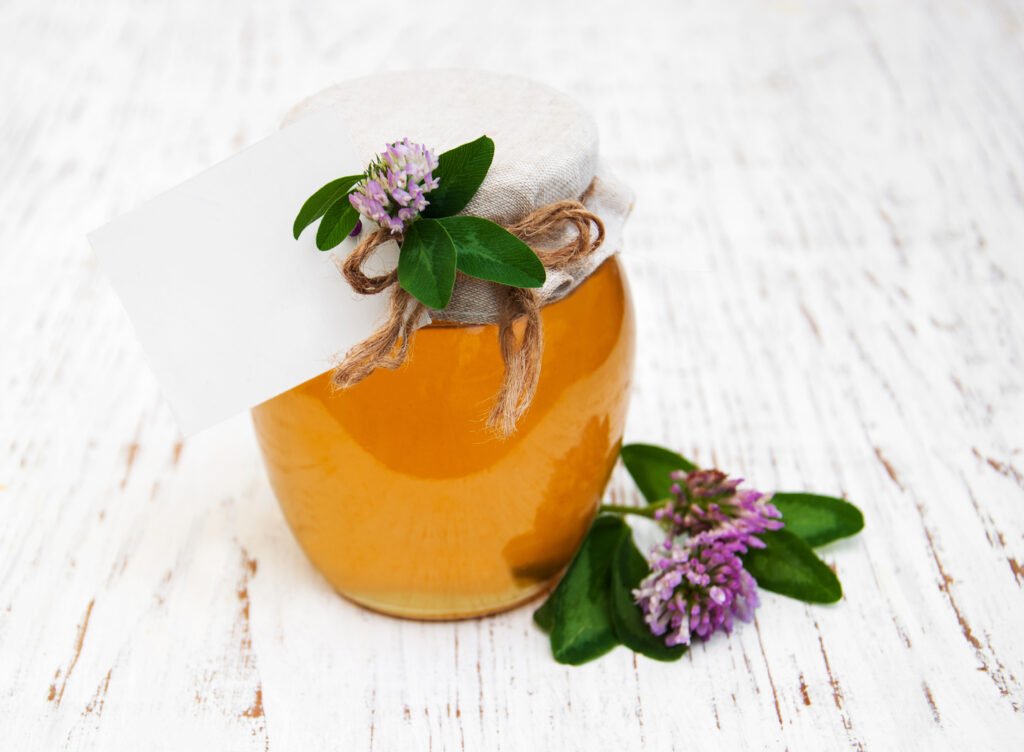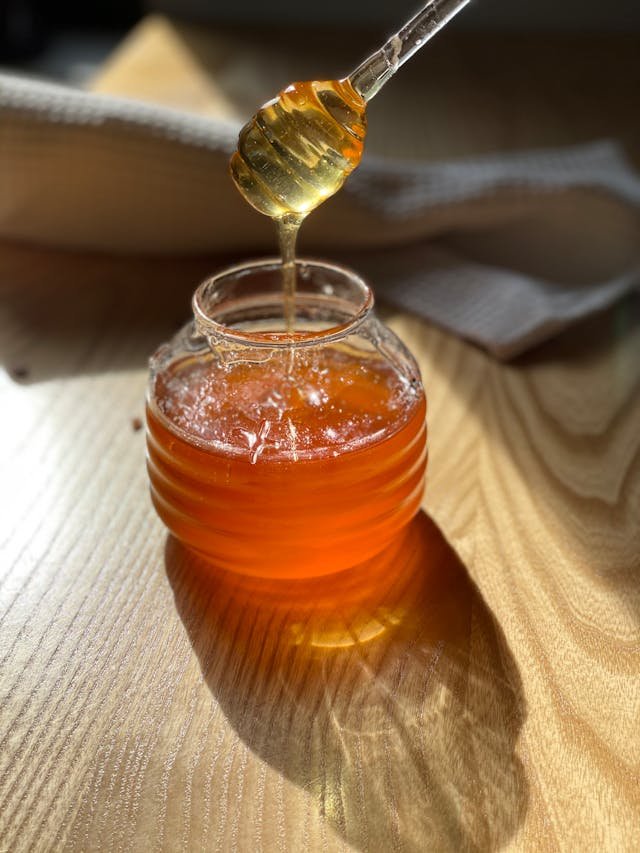Clover honey is a popular natural sweetener with numerous health benefits, from boosting immunity to soothing skin. Learn how it’s made, its uses, and the key health advantages that make it an excellent addition to your diet. Discover how to choose the best clover honey and where to buy it.
What is Clover Honey?
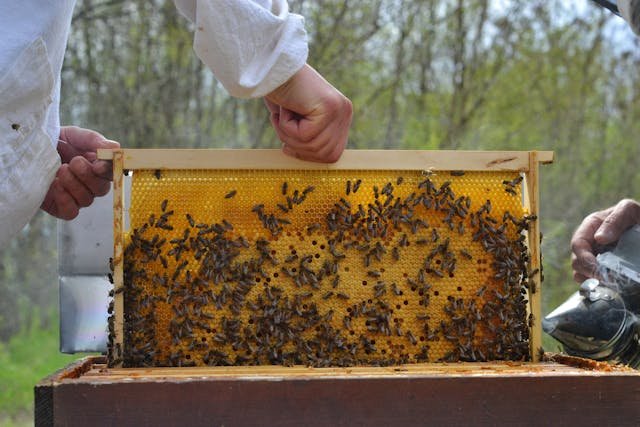
Clover honey is a natural sweetener produced by honeybees that collect nectar from clover plants. It is known for its light, golden color, and mild, sweet taste. Clover plants, found widely in North America and Europe, bloom with tiny white, pink, or purple flowers that attract bees.
This type of honey is highly popular because it is versatile. It can be used in cooking, baking, or as a topping for foods like toast and yogurt. Clover honey has a good texture and is easy to spread, making it an everyday favorite in many homes.
Nutritional Value of Clover Honey
Clover honey is a high-energy food. It is mostly carbohydrates, mainly natural sugars like fructose and glucose.
Here is a summary of Clover Honey’s Nutritional Profile (Per 1 Tablespoon / 21 grams):
Nutrient | Amount per 21 grams | % Daily Value |
Calories | 60 kcal | ~3% |
Total Carbohydrates | 17 grams | ~6% |
Sugars | 16 grams | – |
Protein | 0 grams | 0% |
Fat | 0 grams | 0% |
Vitamin C | 0.1 mg | ~0% |
Vitamin B6 | 0.004 mg | ~0% |
Niacin (Vitamin B3) | 0.03 mg | ~0% |
Riboflavin (Vitamin B2) | 0.02 mg | ~0% |
Folate (Vitamin B9) | 1 mcg | ~0% |
Calcium | 1 mg | ~0% |
Potassium | 11 mg | ~0% |
Magnesium | 1 mg | ~0% |
Iron | 0.09 mg | ~0% |
Zinc | 0.04 mg | ~0% |
*Percent Daily Value (%DV) is depend on a 2,000-calorie diet.
Health Benefits of Clover Honey
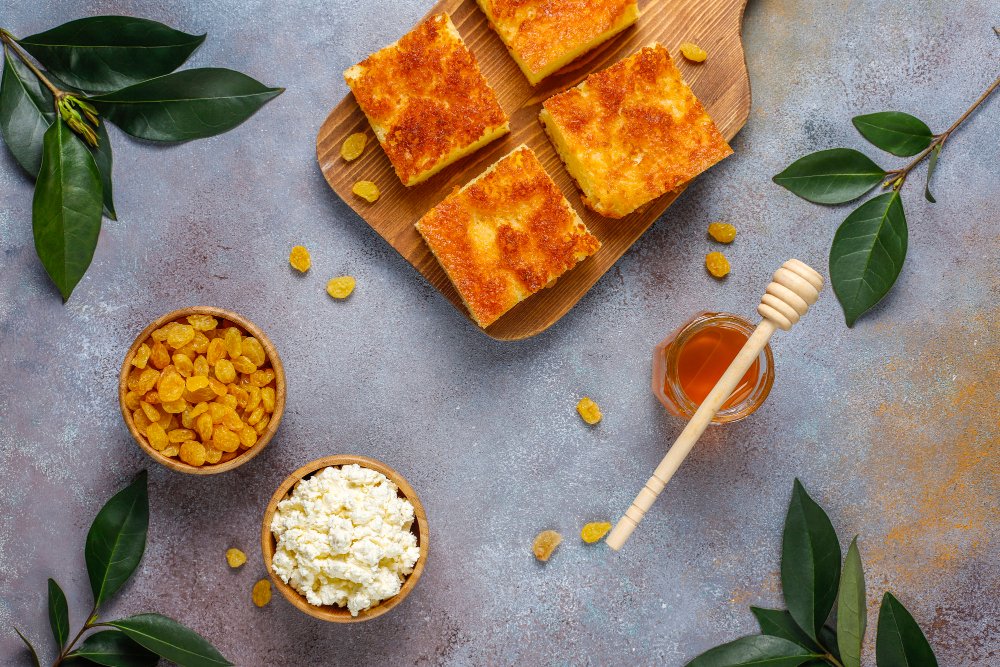
Clover honey is more than just a sweetener. It is popular for its many health benefits. They include antioxidant properties, improved digestion, and boosted immunity. Here’s a look at the proven health benefits of clover honey, backed by statistics.
Rich in Antioxidants
Antioxidants help protect the body from oxidative stress. It can lead to chronic diseases, like heart disease, cancer, and diabetes. Clover honey has many flavonoids and phenolic acids. They are powerful antioxidants.
Statistical Data:
- Clover honey has an antioxidant capacity of 1.7 mmol of Trolox equivalent per 100 grams of honey. This is high compared to other lighter honeys.
- A study in the Journal of Agricultural and Food Chemistry found that honey, including clover honey, raises blood antioxidant levels by 6-8%. This is shown after 2 weeks of daily use.
These antioxidants protect cells from free radical damage. They may reduce cancer risk and slow aging.
Supports Heart Health
Clover honey may improve heart health. It can lower cholesterol and control blood pressure. It contains phenolic compounds, which are known to improve blood vessel function.
Statistical Data:
- Studies found that eating 70 grams of honey daily for 30 days can reduce LDL (bad) cholesterol by 5-10%. It can increase HDL (good) cholesterol by 3-4%.
- A 2020 study in Nutrients found honey lowers systolic blood pressure by 5 mmHg in those with high blood pressure.
Clover honey has polyphenols. They relax blood vessels and improve circulation. They also reduce oxidative stress. These effects are good for the heart.
Boosts Immune System
Clover honey has antioxidants and trace minerals, like zinc and selenium. They boost the immune system. Its antibacterial and anti-inflammatory properties can help the body’s defenses. This makes it easier to protect body from infections.
Statistical Data:
- A 2017 study in the Iranian Journal of Basic Medical Sciences found that honey, including clover honey, can raise immune cell activity by 10-15%. This boosts the body’s ability to fight infections.
- A clinical trial found that regular honey use reduces colds by 12-14%.
Honey can boost the immune system. It can speed recovery and reduce inflammation.
Promotes Digestive Health
Clover honey is a prebiotic. It feeds the beneficial gut bacteria. They are important for a healthy digestive system. These good bacteria help digest food and absorb its nutrients.
Statistical Data:
- Research shows that honey can raise gut Bifidobacterium and Lactobacillus by 5-10% in 4 weeks.
- Clover honey can reduce indigestion. It can also improve gut motility by 7-10% in people with digestive issues.
This benefit is especially helpful for those with IBS or indigestion.
Helps Soothe Coughs and Sore Throats
Clover honey is a well-known home remedy for soothing sore throats and calming coughs. Its thick consistency helps coat the throat and reduce irritation. Its antibacterial properties fight the bacteria that cause infections.
Statistical Data:
- A Cochrane study found honey better than OTC cough suppressants. It reduced coughs by 30-40% in kids aged 1-18.
- A Pediatrics Journal study found that honey cut night-time coughing in children by 38% compared to a placebo. The children took 1-2 teaspoons of honey before bed.
This makes clover honey an effective, natural remedy for soothing respiratory irritation.
Promotes Skin Healing
Clover honey has been a natural remedy for centuries. It heals wounds, burns, and skin irritations. It can help minor injuries heal faster. It has antibacterial and anti-inflammatory properties.
Statistical Data:
- Honey on wounds cut healing time by 25-30% in clinical trials, compared to traditional dressings.
- A review in the Journal of Wound Care found that honey reduces the risk of infection in burns and wounds by up to 70%, promoting faster recovery.
Honey can retain moisture and prevent infections. So, it’s popular for treating minor cuts, abrasions, and burns.
Helps in Weight Management
Although honey is high in natural sugars, it can be a helpful tool in weight management when used in moderation. Replacing refined sugars with honey can cut calories. Honey can also boost metabolism.
Statistical Data:
- A 2018 study from Food and Function found that replacing sugar with honey can cut calories by 5-10%. This can help to reduce weight over time.
- Regular, balanced diet honey consumption improved fat metabolism. It raised the metabolic rate by 4-5%.
How Clover Honey is Made
Clover honey is made from nectar that honeybees gather from blooming clover. It starts in the fields. Clover honey production involves a series of natural steps by honeybees. It results in a smooth, light-colored, and nutrient-rich honey. Here’s a step-by-step breakdown of how clover honey is made, supported by data and scientific insight.
Bees Collect Nectar from Clover Plants
Clover honey comes from honeybees. They collect nectar from clover flowers, a common plant in North America and Europe. Clover flowers have a mild, sweet fragrance that attracts bees. In spring and early summer, these flowers bloom. They give bees a rich source of nectar.
Clover plants are known for their high nectar production, and the type of clover can affect the taste and color of the honey. White clover and red clover are the most commonly used species for clover honey production.
Nectar Is Converted into Honey in the Bee’s Stomach
Once the bees collect the nectar, it is stored in a special organ called the honey stomach. It is separate from their digestive stomach. When its inside the honey stomach, enzymes begin to break down the nectar’s complex sugars. They turn them into simpler sugars like glucose and fructose.
This breakdown process is crucial. Simpler sugars make the honey easier to digest and give it its sweet taste.
Transfer of Nectar to Worker Bees in the Hive
After collecting nectar, the bees return to the hive. They pass the nectar to worker bees through a process called trophallaxis. The worker bees keep breaking down the sugars. They spread the nectar across the honeycomb cells.
At this stage, the moisture content is still high. The worker bees fan the nectar with their wings to help evaporate excess water.
Evaporation and Water Reduction
The next crucial step in honey production is the evaporation of water from the nectar. Bees fan their wings rapidly, creating airflow throughout the hive to lower the water content in the nectar. This process thickens the nectar and transforms it into honey.
Less water in the honey makes it last longer and prevents fermentation.
Honey Storage and Sealing with Beeswax
Once the nectar has turned to honey and it’s dry, bees seal the honeycomb cells with a thin layer of beeswax. This process is called capping, and it protects the honey from air, ensuring it can be stored safely for a long time.
This beeswax sealing is a natural preservative. It keeps the honey fresh and prevents it from absorbing moisture from the air.
Honey Harvesting by Beekeepers
Once the honey is ready, beekeepers carefully store it from the hives. They remove the wax capping and extract the honey using a honey extractor. It spins the honey out of the comb without damaging it.
After extraction, honey is filtered to remove any impurities such as wax or bee parts. Raw honey, like clover honey, is often sold after minimal filtering. This retains its natural nutrients.
Difference Between Clover Honey VS Other Honeys
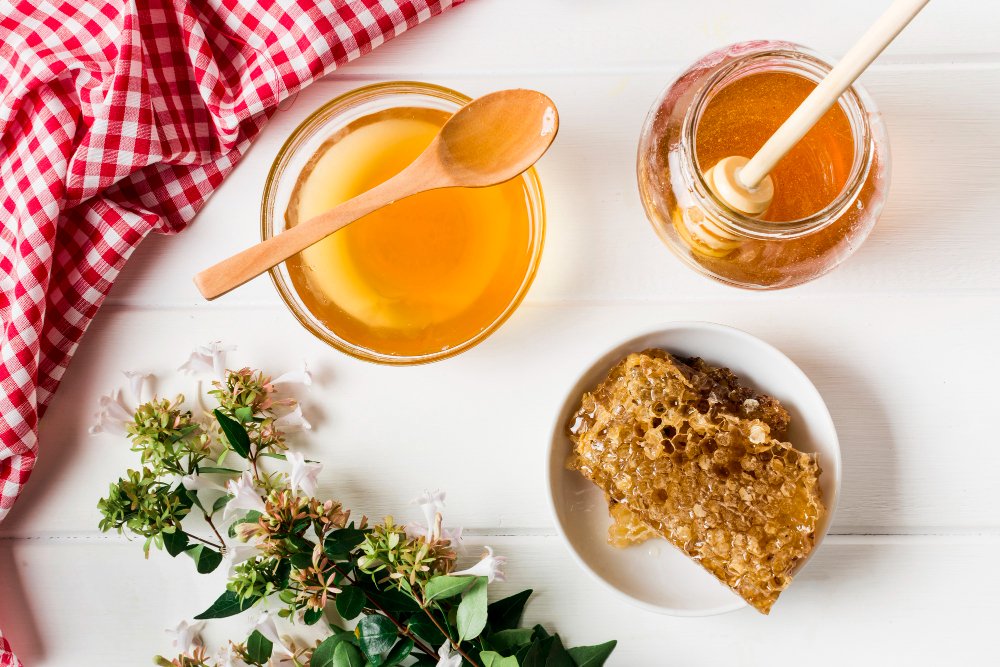
Clover honey is one of many honey types. Each has a unique flavor, color, texture, and health benefits. Clover honey differs from other types of honey. This is due to the flowers the bees collect nectar from, and how the honey is processed. Below, we explore how clover honey compares to other popular varieties.
Clover Honey vs. Manuka Honey
Manuka honey is one of the most famous types of honey due to its strong antibacterial properties. It comes from bees that pollinate the Manuka bush in New Zealand and Australia.
Flavor and Texture:
- Clover Honey: Light, mild flavor, smooth texture. Often preferred for general use because of its balanced taste.
- Manuka Honey: Rich, earthy, and slightly bitter flavor. Its texture is thicker and can be more grainy compared to clover honey.
Health Benefits:
- Clover Honey: Rich in antioxidants and anti-inflammatory compounds, but with moderate antibacterial properties.
- Manuka Honey: It has high levels of methylglyoxal (MGO). This compound gives it strong antibacterial effects. Manuka honey is often used to treat wounds, sore throats, and digestive issues.
Clover Honey vs. Wildflower Honey
Wildflower honey is made from nectar collected from a different types of wildflowers. Wildflower honey’s flavor and color can vary. It depends on the types of blooming flowers.
Flavor and Texture:
- Clover Honey: Mild, sweet, and consistent flavor. Its smooth texture makes it ideal for daily use. It’s great for sweetening teas or drizzling on toast.
- Wildflower Honey: It can have a complex, floral flavor. It varies slightly with the wildflower blend. It’s often darker and thicker than clover honey.
Health Benefits:
- Clover Honey: High in antioxidants and anti-inflammatory properties. It has a lighter composition that makes it versatile.
- Wildflower honey usually has more antioxidants than clover honey. This is due to its mix of flowers. It may have more pollen. This can help those allergic to local pollens.
Clover Honey vs. Buckwheat Honey
Buckwheat honey is made by bees that usually collect nectar from buckwheat flowers. It is known for its dark color and robust, molasses-like flavor.
Flavor and Texture:
- Clover Honey: Mild, sweet, with a light, floral note. It’s a favorite for those who prefer a more neutral taste.
- Buckwheat Honey: Dark, rich, and almost malty in flavor. It has a thicker, heavier texture compared to clover honey.
Health Benefits:
- Clover Honey: Known for its mild antioxidant properties and versatility in daily use.
- Buckwheat Honey has more antioxidants, especially polyphenols. It’s often used for coughs and colds. Darker honeys, like buckwheat, may have 20-40% more antioxidants than lighter ones, like clover
Clover Honey vs. Acacia Honey
Acacia honey comes from the nectar of black locust (Acacia) flowers. It is prized for its light color and high fructose content.
Flavor and Texture:
- Clover Honey: Light, mildly sweet, and floral. It’s highly versatile and pairs well with various foods.
- Acacia Honey: Delicate, sweet flavor with a nearly transparent color. It remains liquid for a longer period because of its high fructose content.
Health Benefits:
- Clover Honey: Contains moderate amounts of antioxidants, vitamins, and minerals.
- Acacia Honey has a low glycemic index (GI). It’s a better choice for those wanting to manage blood sugar. It has a GI of around 32-35, whereas clover honey has a GI of 58.
Clover Honey vs. Orange Blossom Honey
Orange blossom honey comes from bees that collect nectar from citrus trees, mainly orange and lemon blossoms.
Flavor and Texture:
- Clover Honey: Mild, neutral, and very floral in taste. It is a reliable honey for general uses.
- Orange Blossom Honey: Sweet with a light citrus aroma. It is slightly thicker than clover honey and has a distinct, bright flavor.
Health Benefits:
- Clover Honey: Offers general health benefits like antioxidant protection and mild antibacterial properties.
- Orange Blossom Honey has more citrus flavonoids and vitamin C. They boost immunity.
Clover Honey vs. Eucalyptus Honey
Eucalyptus honey comes from the nectar of eucalyptus trees. It is often darker and has a more herbal, medicinal taste.
Flavor and Texture:
- Clover Honey: Mild, sweet, with a light flavor that suits various dishes.
- Eucalyptus Honey: Earthy, with hints of menthol or herbal tones. It is thicker and has a stronger aftertaste.
Health Benefits:
- Clover Honey: Great for everyday use, providing antioxidants and natural energy.
- Eucalyptus Honey: It has anti-inflammatory and antimicrobial properties. It’s useful for respiratory issues and soothing sore throats.
Summary of Differences:
Honey Type | Flavor | Color | Health Benefits | Antioxidant Levels |
Clover Honey | Mild, sweet | Light amber | Antioxidants, digestion support | 1.7 mmol/100g |
Manuka Honey | Strong, earthy, medicinal | Dark brown | Strong antibacterial properties, wound healing | Higher UMF = more potent |
Wildflower Honey | Floral, complex | Dark to light | Higher pollen content, great for allergies | Moderate, depending on mix |
Buckwheat Honey | Rich, molasses-like | Dark brown | High in antioxidants, great for colds and coughs | 3.5 mmol/100g |
Acacia Honey | Light, delicate | Pale yellow | Low GI, beneficial for blood sugar management | High fructose, low glucose |
Orange Blossom Honey | Sweet, with citrus undertones | Light orange | Contains flavonoids, great for immune support | Higher in flavonoids |
Eucalyptus Honey | Herbal, slightly medicinal | Dark amber | Anti-inflammatory, helps with respiratory issues | Strong antibacterial action |
Popular Uses of Clover Honey
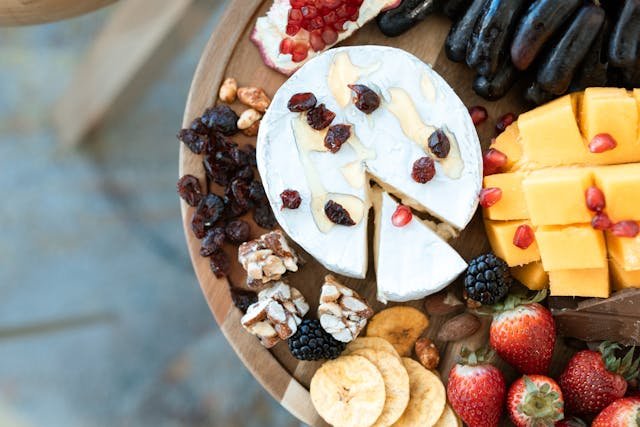
Clover honey has a mild flavor and light color. It’s versatile, so it’s a popular choice for cooking and health uses. From sweetening foods and drinks to its health benefits, here are the main uses of clover honey
Natural Sweetener for Foods and Beverages
Clover honey is a popular natural sweetener because of its mild, balanced flavor. It can replace refined sugar in a wide variety of dishes and drinks.
Common Uses:
- Tea and Coffee: Add a spoonful of clover honey to hot or iced teas and coffees. It will sweeten them without overpowering their taste.
- Smoothies and Shakes: Clover honey is great in smoothies and shakes. It adds sweetness and trace nutrients.
- Breakfast Toppings: Drizzle clover honey over oatmeal, pancakes, waffles, or yogurt. It’s a quick, healthy sweetener.
- Baking: Substitute sugar with clover honey in muffins, cakes, and bread. For every cup of sugar, use about ¾ cup of honey, and reduce the liquid in the recipe slightly.
Marinades and Salad Dressings
Clover honey is smooth and sweet. It is good during making of marinades and salad dressings. Its natural sugars help caramelize meats when grilling or roasting. It can also add depth to vinaigrettes and dressings.
Common Uses:
- Honey Mustard Dressing: Mix clover honey with mustard, vinegar, olive oil, and a pinch of salt. It makes a tangy-sweet dressing.
- Marinades for Meat: To marinate chicken, pork, or beef, mix honey with soy sauce, garlic, and olive oil. The honey helps tenderize the meat and adds a rich, caramelized finish.
- Glazes: Use clover honey as a glaze for roasted vegetables or fish to give them a sweet, shiny coating.
Health Remedy for Coughs and Sore Throats
Clover honey is a popular natural remedy. It soothes sore throats and calms coughs. It has natural antimicrobial properties that fight infections.
Common Uses:
- Honey and Lemon Tea: Stir clover honey into warm water with lemon juice to relieve a sore throat or cough.
- Honey Cough Syrup: Mix clover honey with a pinch of cinnamon and ginger for a natural cough syrup.
- Children’s Cold Remedy: For kids over 1, a teaspoon of honey before bed can reduce coughing at night.
Skincare and Beauty Treatments
Clover honey is common in skincare. It has antibacterial and moisturizing properties. It can be applied directly to the skin to hydrate, heal, and soothe irritation.
Common Uses:
- Face Masks: For a soothing, moisturizing mask, mix clover honey with yogurt, avocado, or oatmeal. Apply the mixture to the skin for 10-15 minutes, then rinse.
- Acne Treatment: Apply a thin layer of clover honey to acne-prone areas. Its antibacterial properties help to protect from redness and inflammation.
- Lip Balm: Mix clover honey, coconut oil, and beeswax. This makes a natural lip balm that keeps lips soft and hydrated.
Energy Booster for Athletes
Clover honey is a natural source of carbs and sugars. It’s an excellent energy booster for athletes and active people. It can be used before, during, or after exercise to provide a quick burst of energy and aid recovery.
Common Uses:
- Pre-Workout Snack: For a quick energy boost, spread clover honey on toast or add it to a smoothie before a workout.
- Energy Gel Alternative: In long endurance activities, like running or cycling, athletes can use a spoonful of honey instead of energy gels.
- Post-Workout Recovery: After exercise, combine clover honey with protein shakes or smoothies. It helps replenish glycogen and aids muscle recovery.
Digestive Aid
Clover honey is a prebiotic. It feeds beneficial gut bacteria. They are playing a important role for a healthy digestive system. It can help soothe digestive issues and promote gut health.
Common Uses:
- Honey in Herbal Teas: Add clover honey to herbal teas, like peppermint or ginger. It helps with indigestion and supports digestion.
- Honey Water: Drinking warm water with honey can aid digestion and relieve constipation.
- Natural Prebiotic: Clover honey helps good bacteria, Lactobacillus and Bifidobacterium, grow. They improve digestion and nutrient absorption.
Natural Remedy for Burns and Wounds
Clover honey can treat minor burns, cuts, and wounds. It has antibacterial and anti-inflammatory properties. It disinfects wounds, reduces pain, and speeds healing by promoting tissue growth.
Common Uses:
- Burn Relief: Apply a thin layer of honey directly to a minor burn to reduce pain and prevent infection.
- Wound Dressing: Use honey as a natural dressing for cuts and abrasions. It keeps the wound clean and speeds up healing.
- Scar Reduction: Applying clover honey to healing skin can help reduce scars.
Weight Management
Honey is high in natural sugars. But, it is a better choice than refined sugar, if used in moderation. Its sweeter taste means you can use less of it, which can help reduce overall calorie intake. Additionally, honey has been linked to improved fat metabolism.
Common Uses:
- Honey Lemon Water: Start your day with warm water, lemon, and clover honey. It will kickstart your metabolism.
- Sugar Substitute: Use clover honey instead of sugar in your tea, coffee, or baking. It will cut empty calories.
- Before Bed: Some use honey before bed to stabilize blood sugar. This may prevent cravings the next day.
Where to Buy Clover Honey
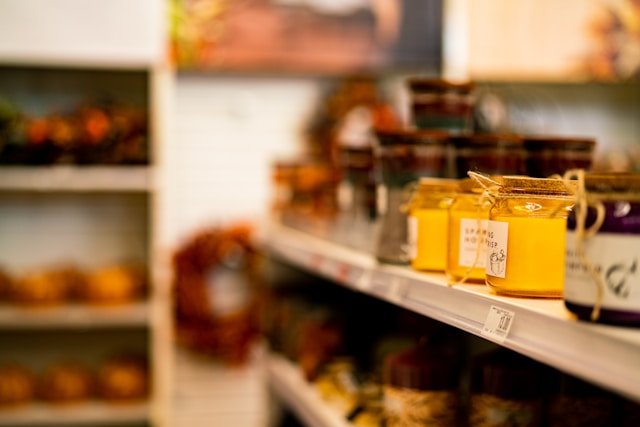
Clover honey is popular as a natural sweetener with health benefits. So, it is widely available online and in stores. You can buy clover honey in many places. They sell raw, organic, and locally sourced varieties. Each has different benefits for quality, price, and convenience.
Local Farmers’ Markets
One of the best places to find high-quality, raw clover honey is at your local farmers’ markets. Buying honey from local beekeepers often means it is fresher. It is also more likely to be raw. This means it retains its full nutrient profile, including enzymes and pollen.
Advantages:
- Locally sourced honey is usually fresher than store-bought. It is also less likely to be processed.
- Supporting Local Businesses: You’re directly supporting local beekeepers and the surrounding economy.
- Allergy Benefits: Some evidence suggests that local honey may reduce seasonal allergies. It might do this by exposing you to local pollen.
Health Food Stores
Health food stores, like Whole Foods and Trader Joe’s, often carry a wide variety of honey. This includes raw and organic clover honey. These stores usually prioritize high-quality products. They may sell honey from certified organic sources. It is free from pesticides and chemicals.
Advantages:
- Health food stores often sell various honey products. They include organic, raw, and infused varieties.
- Organic Options: Many health food stores sell certified organic clover honey. It’s free from synthetic chemicals.
- Quality Assurance: You can usually trust health food stores more than some supermarkets. They tend to stock better products.
Supermarkets
Major supermarkets like Walmart, Kroger, and Costco carry clover honey. The selection may include raw, organic, and processed options. But, it’s one of the most convenient ways to buy clover honey.
Advantages:
- Convenience: Supermarkets are easy to find. They are a quick option for picking up honey on regular grocery trips.
- Affordability: You can often find cheap clover honey at larger retailers. It may be cheaper than at specialty stores or farmers’ markets.
- Availability: Supermarkets stock honey year-round, making it readily available when needed.
Online Retailers
Websites like Amazon, Thrive Market, iHerb, and Walmart sell many clover honey options. They often have user reviews to help you decide. Online shopping gives you access to many brands. They include rare, raw, and organic clover honey from different regions.
Advantages:
- Wide Selection: Online retailers offer a better variety of honey. This includes organic and specialty brands not found in local stores.
- Convenience: You can order honey to your door, often with fast shipping.
- Customer Reviews: Many sites offer customer reviews and ratings. They help you make better decisions based on others’ experiences.
Top Brands Available Online:
- Nature Nate’s Raw and Unfiltered Clover Honey
- Really Raw Honey
- Y.S. Organic Bee Farms Clover Honey
- Dutch Gold Pure Clover Honey
Specialty Stores and Co-ops
Smaller specialty stores and co-ops often sell local, organic, raw honey. These stores focus on sustainable products and natural goods. They offer high-quality honey for those willing to pay a premium.
Advantages:
- High-Quality: Specialty stores are more likely to have premium honey. This includes raw, organic, or sustainably harvested varieties.
- Ethical Sourcing: Many specialty stores partner with local, small-scale beekeepers. They practice ethical, sustainable beekeeping.
- Unique Varieties: You can find rare, high-end honey products. These include raw clover honey infused with herbs or spices.
Direct from Beekeepers
Many beekeepers sell honey directly through their own websites or local farm stands. Buying honey directly from a beekeeper gives you a fresh, pure product. It also supports sustainable, ethical beekeeping.
Advantages:
- Quality Control: Buying from the beekeeper guarantees raw, unfiltered honey, with no additives.
- Transparency: Beekeepers can provide details about the honey’s source. This includes how the bees are treated and how the honey is processed.
- Personalized Service: You can often contact the beekeeper directly. Ask about their honey, the beekeeping process, or request special orders.
Bulk Purchase from Wholesalers
For regular users of clover honey, buying in bulk is cost-effective. Wholesalers like Costco and others online are good sources. These retailers sell larger quantities of honey at a lower price. It’s ideal for families or businesses that use honey often.
Advantages:
- Cost Savings: Buying in bulk lowers the price per ounce, making it cheaper for long-term use.
- Consistent Supply: Bulk purchases guarantee a supply of honey. This cuts down on trips to the store.
- Good for Businesses: Bulk pricing on honey can help restaurants and cafes that use it often.
How to Choose the Best Clover Honey
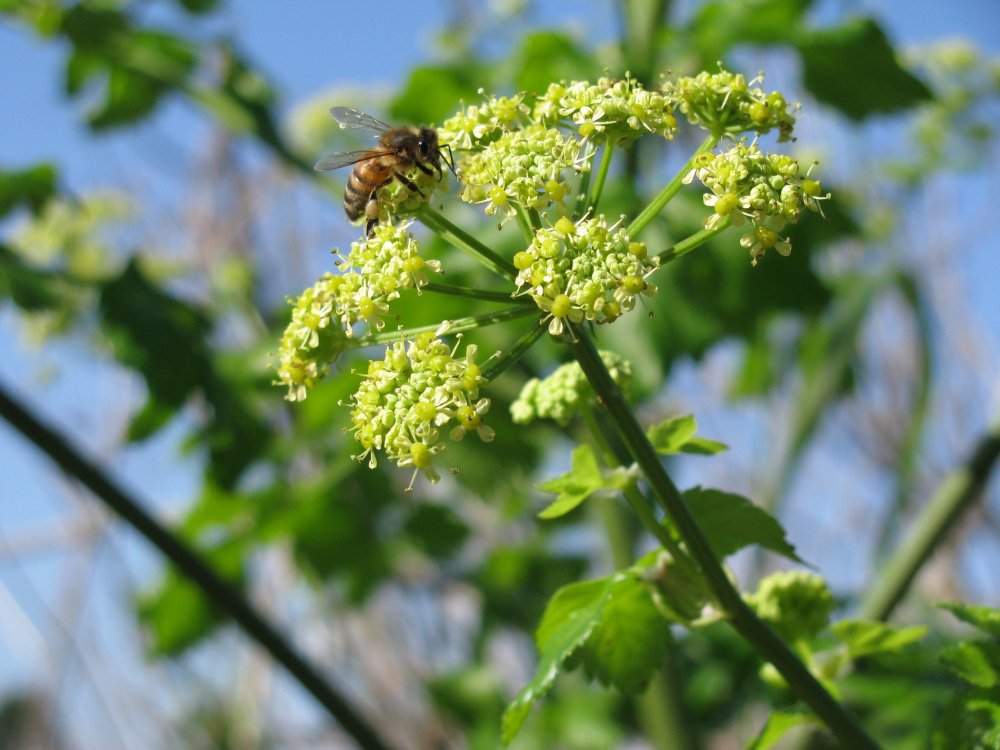
When it comes to buying clover honey, not all products are created equal. There are several factors to consider, such as whether the honey is raw, organic, or processed. To choose the best clover honey, know its quality, source, and label. Below, we’ll explore key tips to help you choose the best clover honey for your needs.
Choose Raw Honey Over Processed Honey
A key factor in choosing clover honey is whether it’s raw or processed. Raw honey is unheated, unpasteurized, and unprocessed. So, it retains all its natural enzymes, vitamins, and minerals. Processed honey is heated and filtered. This removes many beneficial compounds.
Why Raw Honey is Better:
- Nutritional Value: Raw honey has natural antioxidants, enzymes, and pollen. These are often lost in processing.
- Enzymes: Raw honey retains key enzymes like glucose oxidase, which has antibacterial properties.
- Unfiltered: Raw honey may be cloudier than processed honey. It contains bits of pollen and propolis, which are healthy.
How to Identify Raw Honey:
- Search for labels that say “raw” or “unfiltered”.
- Raw honey may be cloudy or slightly crystallized. This is normal. It means it hasn’t been overly processed.
Check for Organic Certification
To ensure your honey is free of pesticides, choose organic honey. Organic honey comes from bees that gather nectar from organic flowers. It is processed without chemicals.
Why Organic Matters:
- No Pesticides: Organic certification means no harmful pesticides on the flowers the bees visit.
- Cleaner Harvesting Methods: Organic beekeeping bans antibiotics and chemicals in hives.
- Sustainability: Organic honey is often produced by beekeepers who prioritize environmental sustainability.
How to Identify Organic Honey:
- Look for USDA Organic or other labels, like EU Organic or Canada Organic.
- Beekeepers may note their use of sustainable practices on their labels or websites.
Look for Local Honey
Buying local honey supports local beekeepers. It also gives you fresher honey that may have health benefits. Locally produced honey often has traces of local pollen. Eating it regularly may help reduce seasonal allergies.
Benefits of Local Honey:
- Fresher Product: Local honey is usually harvested more recently. So, it keeps more of its natural nutrients and flavor.
- Allergy Relief: Some studies suggest that local honey may reduce seasonal allergies. It does this by exposing the body to small amounts of local pollen.
- Supporting Local Beekeepers: Purchasing local honey supports local agriculture and sustainable beekeeping practices.
How to Identify Local Honey:
- Look for honey at farmers’ markets or from local beekeepers. Many list the source of their honey on the label.
- Some stores also carry locally sourced honey, labeled with the region of origin.
Check the Color and Texture
The color and texture of honey can tell you a lot about its quality. Clover honey is typically light golden in color and has a smooth, slightly runny texture. If the honey is too dark or odd-textured, it may be mixed with other honeys or over-processed.
Color and Texture Indicators:
- Light Color: Pure clover honey should have a pale amber or light golden hue.
- Crystallization: Honey naturally crystallizes over time, especially raw honey. Crystallized honey is still safe to eat and can be liquefied by placing the jar in warm water.
- Clover honey should be smooth and consistent. Raw honey might be thicker due to pollen and other natural particles.
Avoid Honey with Added Sugars
Some honey is mixed with sweeteners like high fructose corn syrup or cane sugar. This dilutes its purity and reduces its health benefits. To ensure you’re getting pure clover honey, check the ingredient list for any added sugars.
Why Pure Honey Matters:
- No Additives: Pure honey has no added sugars or artificial ingredients. It is a natural product.
- Higher Nutritional Value: Honey mixed with syrups or sugars lacks the vitamins, minerals, and enzymes of pure honey.
- Better Taste: Pure clover honey is lightly, sweet, and floral. Honey with additives can taste artificial.
How to Identify Pure Honey:
- Search for labels that say “100% pure honey” or “no additives”.
- Be cautious of unusually cheap honey, which may be diluted with corn syrup or other sweeteners.
Buy from Trusted Brands
To get high-quality clover honey, buy from trusted brands. Many trusted honey producers follow strict purity and quality standards. They ensure their products are free from additives and contaminants.
Top Clover Honey Brands:
- Nature Nate’s Raw and Unfiltered Clover Honey: It’s known for its high quality and raw, unfiltered process.
- Y.S. Organic Bee Farms Clover Honey: It is certified organic. It is from sustainable sources.
- Dutch Gold Pure Clover Honey: A widely recognized brand offering pure, natural honey.
How to Identify Trusted Brands:
- Look for brands with positive reviews and clear sourcing info. Also, check for certifications like USDA Organic or True Source Honey.
Consider the Price
Price is often a good indicator of honey quality. Cheaper honey may be tempting. But, it often lacks purity, quality, and good sourcing. High-quality clover honey, especially organic and raw, may cost more. But, it’s worth it for the health benefits and better taste.
Price Indicators:
- Cheap honey may be mixed with sweeteners or over-processed. This reduces its health benefits.
- Premium honey is from sustainable sources. It is raw, unfiltered, and without additives. These traits justify its higher cost.
Frequently Asked Questions About Clover Honey
Is clover honey better than regular honey?
Answer: Clover honey is a type of regular honey. It’s made from bees that gather nectar from clover flowers. It has a mild flavor and light color compared to other types like wildflower or buckwheat honey. Clover honey is not “better” than other types. But, many prefer it for its neutral taste. It’s versatile for cooking and medicine. Other honey varieties may have stronger flavors or more antioxidants. Examples are manuka and buckwheat honey.
Can clover honey help with allergies?
Some say that local clover honey may help with allergies. The theory is that eating local honey may help. It contains local pollen. It might help your body tolerate local allergens. However, scientific research on this is limited, and results are mixed. If you want to try honey for allergy relief, opt for raw, local honey that contains local pollen.
Is clover honey good for weight loss?
Clover honey has natural sugars and calories. But, it is a better option than refined sugar for a weight loss diet. It’s sweeter than sugar, so you can use less of it to achieve the same sweetness, which can reduce your calorie intake. However, honey should still be consumed in moderation as it is high in natural sugars. Using small amounts of clover honey may satisfy sweet cravings. It can help avoid processed sugar.
Can I use clover honey on my skin?
Answer: Yes, clover honey is great for skincare. It is antibacterial and moisturizing. So, it is a natural remedy for acne, dry skin, and minor cuts or burns. You can use it in three ways. Apply it as a mask to your face. Mix it with other natural ingredients for DIY skincare. Or, use it as a spot treatment for pimples. Many use clover honey to soothe irritation and for its antioxidants. It’s an anti-aging treatment.
How do I know if my clover honey is real or fake?
Answer: To ensure you’re buying real clover honey, look for the following:
- Labeling: Check for labels that say “100% pure clover honey,” “raw,” or “organic.”
- Crystallization: Raw honey tends to crystallize over time. Fake honey, often mixed with sugar syrup, will stay liquid. Crystallization is a natural process and a sign of purity.
- Price: If the honey is very cheap, it may be diluted with sugar or corn syrup.
- Source: Buy from reputable brands or local beekeepers. They often provide better quality than mass-produced commercial honeys.
Is clover honey safe for babies?
Answer: No, honey of any type, including clover honey, is not safe for infants under 1 year old. Honey can have Clostridium botulinum spores. They can cause infant botulism, a rare but serious illness. The immune systems of babies under 1 year old are not fully developed and may not be able to fight off these spores.
Can clover honey help with a cough?
Answer: Yes, clover honey can be effective in soothing a cough. Honey coats the throat, reducing irritation and providing relief from coughing. Some studies suggest honey may be as effective as cough syrups. For the best results, take 1-2 teaspoons of honey before bed if you have a cough or sore throat.
Is clover honey raw if it says “pure” on the label?
Answer: Not necessarily. “Pure” means the honey has no additives, like corn syrup. It doesn’t guarantee that the honey is raw. Raw honey is honey that hasn’t been pasteurized or processed. It still has beneficial enzymes, pollen, and nutrients. Always look for the word “raw” if you’re specifically seeking raw honey.
How can I use clover honey for hair care?
Answer: Clover honey can be used in hair care as a natural conditioner. It helps to lock in moisture, adds shine, and reduces frizz. Mix clover honey with coconut oil or yogurt to make a DIY hair mask. Apply it to damp hair for 20-30 minutes, then rinse. Honey is great for dry or damaged hair. Its humectant properties draw moisture into the hair.
Is clover honey gluten-free?
Answer: Yes, clover honey is naturally gluten-free. Honey is made from the nectar of flowers, and it doesn’t contain any wheat, barley, or rye, which are the sources of gluten. However, if you have celiac disease or a gluten allergy, check the label. Make sure the honey wasn’t processed in a facility that handles gluten.
Is clover honey vegan?
Answer: Technically, honey is not considered vegan because it is produced by bees. Some vegans avoid honey as it’s an animal byproduct. Others eat it for its natural, unprocessed nature. Clover honey is natural. Its vegan-friendliness depends on personal beliefs.

